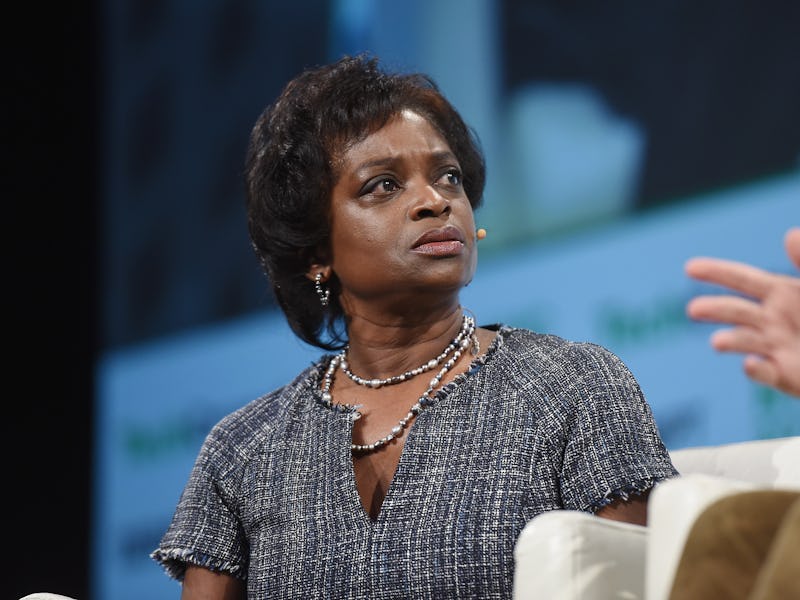Net Neutrality Isn't Going Down Without a Fight
Commissioner Mignon L. Clyburn isn't taking this lying down.

The Republican-controlled Federal Communications Commission officially started the process of ending net neutrality on Thursday, but the dissenting member on the bipartisan Commission isn’t going to go down without a fight.
The FCC announced WC Docket 17-108 on Thursday, a notice of proposed rulemaking that would reverse its 2015 decision to regulate internet service providers as public utilities. Right now, the FCC’s preliminary vote on the rulemaking is split right down party lines 2-1, with the two Republican commissioners voting in favor of effectively ending net neutrality, and the lone Democratic commissioner, Mignon Clyburn, standing alone against them. She may be outvoted on the commission, but her fiery dissenting opinion is sure going to get heard.
The FCC is chaired by frequent target of John Oliver and former Verizon lawyer Ajit Pai, a Republican commissioner who stepped into the FCC’s top spot on the order of President Donald Trump. Pai has been an outspoken critic of the Obama-era regulations, and has wasted little time in his short tenure as Chairman in pushing to give them the axe.
On the other hand, Clyburn, a Democrat nominated by President Obama in 2009, strongly disagrees with Pai, and her dissenting opinion is filled with white-hot fire against the Republican plan to let ISPs and telecom giants have their way with the internet.
After a personal preamble about meeting homeless residents of Los Angeles’s Skid Row and learning about how they retain their voice and citizenship through the internet, Clyburn rolls up her sleeves and starts swinging (emphasis ours, but it hardly needs it):
Today’s Notice of Proposed Rulemaking, more appropriately known as the Destroying Internet Freedom NPRM, deeply damages the ability of the FCC to be a champion of consumers and competition in the 21st century. It contains a hollow theory of trickle-down internet economics, suggesting that if we just remove enough regulations from your broadband provider, they will automatically improve your service, pass along discounts from those speculative savings, deploy more infrastructure with haste, and treat edge providers fairly.
Pai and the Republicans’ point of view is relatively simple: The Obama era regulations expose the private corporations providing internet access to America to bloated bureaucratic meddling and undue regulation. Instead, companies should be governed with a so-called “lighter touch” and let the free market flourish through increased investment. This is the “hollow theory of trickle-down internet economics” Clyburn is referring to. Letting ISPs govern asks the public to trust private corporations to put public interest above their own profit, which just speaking historically here, hasn’t been a super good bet.
“But if you unequivocally trust that your broadband provider will always put the public interest over their self-interest or the interest of their stockholders, then the Destroying Internet Freedom NPRM is for you,” Clyburn quips.
The classic pro-net neutrality example here is that lifting the 2015 regulations will give ISPs the option to prioritize some data over others, meaning that they could throttle connection speeds to competing websites and set up unfair monopolies, especially for users in areas without many options for internet service. As Clyburn notes, the 2015 legislation has been upheld twice by federal courts. Clyburn also notes that, in so many words, the Republican plan is full of hypocrisy and bullshit economics, dropping her Banking/ Finance/ Economics degree in there for added emphasis.
I must vociferously dissent from this NPRM, because it has all the indicia of a political rush job. Month after month, I listened to repeated calls from the current leadership about how economic analyses were missing from the last administration’s items, how troubling that was, and because of the absence of analysis, we were jeopardizing our ability to make sound decisions. But unless I missed it, and I would welcome a correction if I am in error, there was no FCC staff economist or technologist consulted during the drafting of this item. If they were, and I majored in Banking, Finance, and Economics, but admittedly, I am out of practice, I cannot find any evidence of it given the dearth of economic and technical depth in this NPRM.
The dissenting opinion goes on, and if you’re curious at all about the future of net neutrality under the Republican plan, the full letter is worth a read. Clyburn ends the whole thing with a supreme bit of written side-eye.
Nonetheless, I thank the staff of the Wireline Bureau and Office of General Counsel for their work on this item. I may think this rulemaking is a horrible path to go down, but your hard work should be recognized regardless.
Translation: “Thanks for your hard work everyone, but I wish you didn’t put out all that effort for this piece of hot-garbage legislation.”
Public comments are temporarily closed on the FCC’s website but should be open again soon. They’re already getting deluged in comments. Interestingly, the FCC currently has two vacant commissioner seats — it’s supposed to be a five-person commission, but right now Pai, Clyburn, and Republican Michael O’Rielly are the only ones on it. By law, only three members of the commission can be of the same political party, which means eventually Clyburn will get at least one other Democrat on the commission with her, but with the Republicans in control of the White House and both houses of Congress, it’s highly unlikely the Republicans will lose their majority vote on the FCC any time soon. But if Clyburn’s initial dissent is any indication, the minority certainly intends to be vocal.
Meantime, watch this update that Oliver — arguably the most prominent critic of the FCC and supporter of net neutrality — shared with viewers of his HBO show on Sunday: